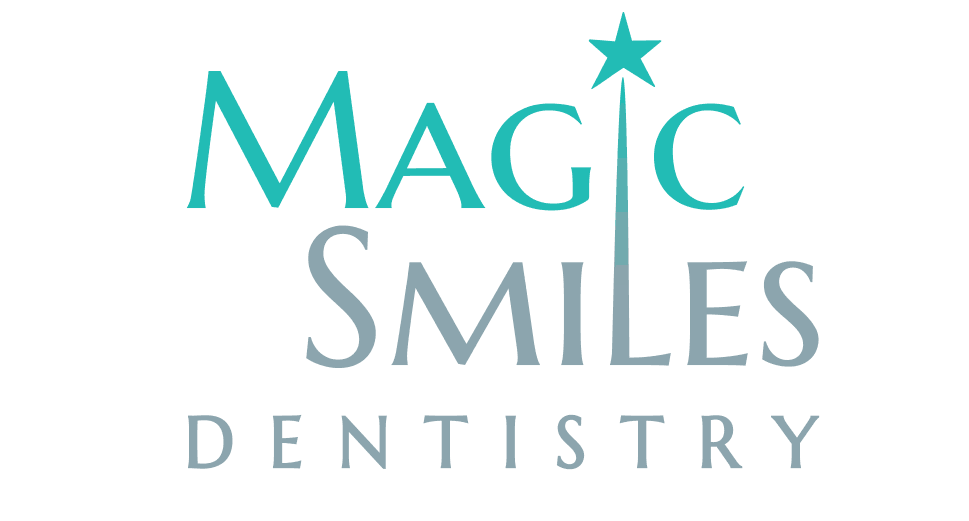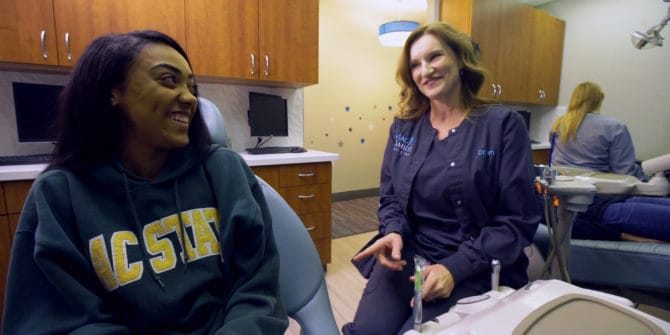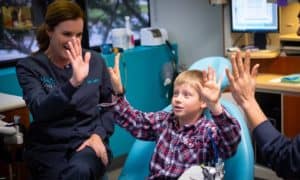First Tooth. First Birthday. First Visit.
Your child’s first experiences with a dentist can have a tremendous impact on their attitudes toward dentistry for the rest of their life. That’s why we encourage you to bring your child in for a “Peek-A-Boo” visit by their first birthday. The earlier you introduce your child to the dentist, the more comfortable they’ll be with dental appointments in the future.
What to Expect at Your “Peek-A-Boo” Visit
This first appointment is all about showing that the dentist’s office is a fun, safe, friendly space for your child. Our team knows how scary a first visit can be, both for kids — and for mom and dad. So the “Peek-A-Boo” visit is a fun, casual, parent-involved time to introduce your child to his or her dentist and to talk through any dental questions or concerns you may have about your child’s developing teeth.
Fun, Safe Environment
We want to make sure your child will love coming to Magic Smiles, from the very first time they visit. So during your child’s “Peek-A-Boo” visit, they will sit in your lap instead of the dental chair. This will help put them at ease in this new environment.
A Magical Experience
While your little one laughs and reaches for bubbles, Dr. Datwyler will be able to take a quick peek at their teeth and gums. We’re just looking around to see how many teeth they have, how fast they’re developing, and if there are any issues that need to be addressed.
Personal Attention
We believe that every child and every parent that visits our practice deserves our full attention. So when people walk through the door, they’re immediately greeted by name and we want you to feel like you’re a part of our family here at Magic Smiles.
Peek-A-Boo Visits
During your Peek-A-Boo visit, please feel free to ask us any questions at all that you have about your child’s developing teeth. We often speak with parents about tips for teething, using pacifiers, nutrition, and more. We can also give you tips on how to brush and floss baby teeth, prevent cavities, and how to clean their teeth between nursing sessions (if they’re still nursing).
When should my child visit a dentist for the first time?
Let the first tooth, which will surface between six and twelve months, remind you that it’s time to see your pediatric or general dentist. Though this may seem early, 40% of toddlers between two and three have some inflammation of the gums and/or cavities. Be sure to get advice on tooth cleaning, pacifiers, fluoride and preventing tooth injuries for young walkers.
Should I be worried about thumb-sucking or using a pacifier?
Sucking is a natural reflex and infants as well as young children may use thumbs, fingers, pacifiers or other objects on which to suck. It seems to make them feel secure and happy or provide a sense of security at difficult periods. Since sucking is relaxing, it may also induce sleep.
Thumb or pacifier sucking that persists beyond the eruption of the permanent teeth can cause problems with the proper growth of the mouth and tooth alignment. How intensely a child sucks will determine whether or not dental problems may result. Children who rest their thumbs passively in their mouths are less likely to have difficulty than those who vigorously suck their thumbs.
Usually, children stop sucking their thumbs or on pacifiers between the ages of two and four. Parents should encourage their older children to stop the sucking habit by the time their permanent front teeth are ready to erupt. Peer pressure causes many school-aged children to stop.
When should my child start brushing his/her teeth?
Brushing should actually begin before children are capable of doing it themselves. A wet cloth or gauze effectively cleans gums and removes plaque after nursing and establishes a good habit early on. Begin brushing gently with a soft bristle brush when the first tooth comes in and begin flossing when most of the primary teeth are in.
At six or seven, children can brush on their own, with careful supervision. And by eight or nine, they can floss on their own too.
The American Academy of Pediatric Dentistry says “a good rule of thumb is this…When children are accomplished enough in caring for their own needs that they can get up, bathe and dress themselves and comb their hair without your help – then they are ready to accept full responsibility for their mouth-cleaning program!”
Is my child teething?
Teething is when an infant’s first teeth (often called “baby teeth”) start to appear by emerging through the gums. You might notice soreness and swelling of the child’s gums before a tooth comes through. That’s the cause for the pain and fussiness a baby experiences during this stage. While the level of discomfort varies for each child, it is normal to be fussy and uncomfortable while teething.
It’s a common misconception that teething causes fever. While teething might be accompanied by slightly elevated temperature, it does not cause a rise into the fever range (greater than 100 °F).
Be sure to talk with your dentist if you’d like some tips to help with teething!
Tips to Make Your Child’s First Visit Go Smoothly
We have a great team that absolutely loves kids, so we will do everything we can to make it a fun, stress-free experience for your little one. As a parent, the best thing you can do is to treat this first visit as a casual experience. The most important part of this visit is to make sure that your child feels safe and is comfortable with everything happening.
We can’t wait to meet you and your little one!










